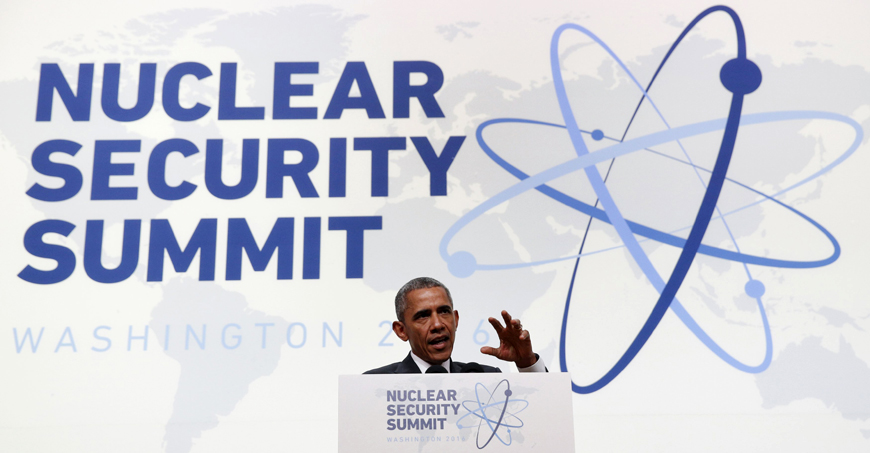WASHINGTON — US President Barack Obama urged world leaders on Friday to do more to safeguard vulnerable nuclear facilities to prevent "madmen" from groups like Daesh from getting their hands on a nuclear weapon or a radioactive "dirty bomb".
Speaking at a nuclear security summit in Washington, Obama said the world faced a persistent and evolving threat of nuclear terrorism despite progress in reducing such risks. "We cannot be complacent," he said.
Obama said no group had succeeded in obtaining bomb materials but that Al Qaeda had long sought them, and he cited actions by Daesh militants behind recent attacks in Paris and Brussels that raised similar concerns.
"There is no doubt that if these madmen ever got their hands on a nuclear bomb or nuclear material, they would certainly use it to kill as many innocent people as possible," he said. "It would change our world."
Obama hosted more than 50 world leaders for his fourth and final summit focused on efforts to lock down vulnerable atomic materials to prevent nuclear terrorism, which he called "one of the greatest threats to global security" in the 21st century. North Korea's nuclear defiance was also high on the agenda.
Obama has less than 10 months left in office to follow through on one of his signature foreign policy initiatives. While gains have been made, arms-control advocates say the diplomatic process — which Obama conceived and championed — has lost momentum and could slow further once he leaves the White House in January.
A boycott by Russian President Vladimir Putin, unwilling to join in a US-dominated gathering at a time of increased tensions between Washington and Moscow over Ukraine and Syria, may have contributed to summit results marked by mostly technical measures instead of policy breakthroughs.
At the closing news conference, Obama, a Democrat, made clear that the raucous Republican presidential race, particularly controversial comments by party front-runner Donald Trump, weighed on leaders' discussions on the summit sidelines.
Obama sternly dismissed as proof of foreign-policy ignorance Trump's recent suggestion that Japan and South Korea should be allowed to build their own nuclear arsenals, putting him at odds with decades of US policy.
"The person who made the statements doesn't know much about foreign policy or nuclear policy or the Korean peninsula, or the world generally," Obama said, adding that Americans don't want anyone with such views to occupy the White House.
‘Dirty bomb’ threat
Deadly bomb attacks in Brussels last month have fueled concern that Daesh could eventually target nuclear plants, steal material and develop radioactive dirty bombs. Militants were found to have videotaped the daily routine of a senior manager of a Belgian nuclear plant, Obama said.
Obama said the required 102 countries have now ratified an amendment to a nuclear security treaty that would tighten protections against nuclear theft and smuggling.
"Our nations have made it harder for terrorists to get their hands on nuclear materials. We have measurably reduced the risks," he said.
But he acknowledged that with roughly 2,000 tons of nuclear material stored around the world, "not all of this is properly secured".
Obama, wrapping up the summit, said the leaders had agreed to keep strengthening their nuclear facilities against cyber attacks, something that outside experts said remains a major weak point.
The United States and Japan also announced they had completed the long-promised task of removing all highly enriched uranium and separated plutonium fuels from a Japanese research reactor. Japan is an avowedly anti-nuclear-weapons state as the only country to have ever suffered a nuclear attack.
Despite significant strides by Obama in persuading dozens of countries to rid themselves of bomb-making materials or reduce and safeguard stockpiles, much of the world's plutonium and enriched uranium remain vulnerable to theft.
Earlier on Friday, Obama convened a separate meeting of the world powers to take stock of the landmark nuclear pact they negotiated with Iran last July. It is a critical component of his nuclear disarmament agenda and a major piece of his foreign policy legacy.
Obama inaugurated the first Nuclear Security Summit nearly six years ago, after a landmark speech in Prague in 2009 laying out the goal of a world free of nuclear weapons. There is no guarantee that Obama's successor in the White House will keep the issue a high priority.
For now, US experts are less concerned about militants obtaining nuclear weapons than about thefts of ingredients for a low-tech dirty bomb that would use conventional explosives to disperse radioactive material and sow panic.
Obama held a special summit session to coordinate the overall fight against the Daesh terror group. He touted gains against the group in Iraq and Syria, which he said were forcing it to lash out elsewhere, and called for stepped-up efforts to stem the flow of foreign fighters to and from the battlefield.
Also looming over the summit was continuing concern about North Korea. Obama joined South Korean President Park Geun-hye and Japanese Prime Minister Shinzo Abe on Thursday in vowing to ramp up pressure on Pyongyang in response to its recent nuclear and missile tests.
But So Se Pyong, North Korea's ambassador to the United Nations in Geneva, told Reuters on Friday that Pyongyang will pursue its nuclear and ballistic missile programme in defiance of the United States and its allies, saying there is now a state of "semi-war" on the divided peninsula.
